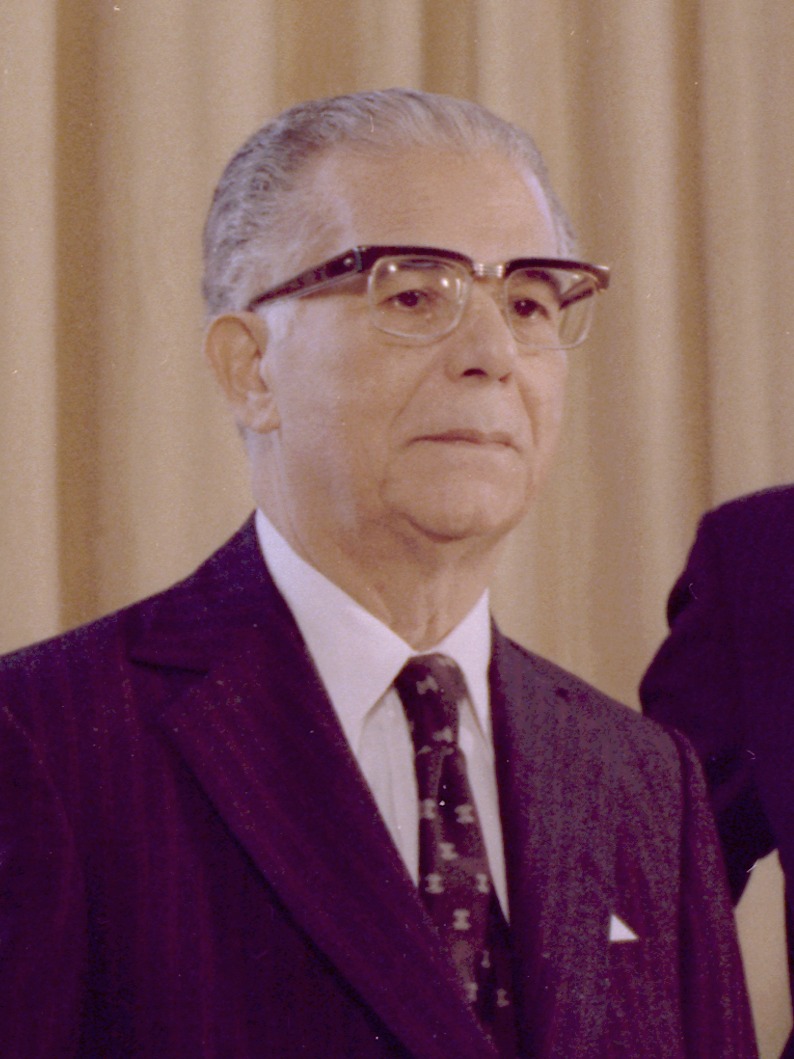
Joaquín Balaguer
Joaquín Antonio Balaguer Ricardo (1 September 1906[1] – 14 July 2002) was a Dominican politician, scholar, writer, and lawyer. He was President of the Dominican Republic serving three non-consecutive terms for that office from 1960 to 1962, 1966 to 1978, and 1986 to 1996.
In this Spanish name, the first or paternal surname is Balaguer and the second or maternal family name is Ricardo.
Joaquín Balaguer
Francisco Augusto Lora
Carlos Rafael Goico
- Héctor Trujillo
- Ramfis Trujillo (as Generalissimo, until November 1961)
1 September 1906
Bisonó, Dominican Republic
14 July 2002 (aged 95)
Santo Domingo, Dominican Republic
Independent
(1924–1966)
Social Christian Reformist Party
(1966–1996)
His enigmatic, secretive personality was inherited from the Trujillo era, as well as his desire to perpetuate himself in power through dubious elections and state terrorism, and he was considered to be a caudillo. His regime of terror claimed 11,000 victims who were either tortured or forcibly disappeared and killed.[2][3] Nevertheless, Balaguer was also considered to be instrumental in the liberalization of the Dominican government, and his time as leader of the Dominican Republic saw major changes such as legalized political activities, surprise army promotions and demotions, promoting health and education improvements and instituting modest land reforms.[4][5]
Early life and introduction to politics[edit]
Balaguer was born on 1 September 1906[6] in Navarrete, later named Villa Bisonó in the Santiago Province in the northwestern corner of the Dominican Republic. His father was Joaquín Jesús Balaguer Lespier,[7] a Spaniard native of Catalan and French ancestry born in Puerto Rico,[7][8] and his mother was Carmen Celia Ricardo Heureaux,[7] daughter of Manuel de Jesus Ricardo and Rosa Amelia Heureaux (of French descent),[7] who was also a half-cousin of President Ulises Heureaux.[7][a] Balaguer was the only son in a family of several daughters.[7]
From a very early age, Balaguer felt an attraction to literature, composing verses that were published in local magazines even when he was very young.[14] He was taught by Santiago-born educator and feminist writer Rosa Smester Marrero;[15][16] in his memoirs, Balaguer recalled Smester's great influence on his intellectual formation.[16]
After graduating from school, Balaguer earned a law degree from the University of Santo Domingo (UASD) and studied for a brief period at the University of Paris I Pantheon-Sorbonne.[17] As a youth, Balaguer wrote of the awe with which he was struck by his father's fellow countryman, the Harvard graduate and political leader from Puerto Rico, Pedro Albizu. Despite the profound differences regarding their ethical and world visions, Albizu's fiery and charismatic rhetoric captured Balaguer's imagination and his recollection of this occasion was a harbinger of his passion for politics and intellectual debate.[18]
Balaguer's political career began in 1930 (before Rafael Trujillo took control of the government) when he was appointed Attorney in the Court of Properties. In later years, he served as Secretary of the Dominican Legation in Madrid (1932–1935), Undersecretary of the Presidency (1936), Undersecretary of Foreign Relations (1937), Extraordinary Ambassador to Colombia and Ecuador (1940–1943 and 1943–1947), Ambassador to Mexico (1947–1949), Secretary of Education (1949–1955), and Secretary of State of Foreign Relations (1953–1956).
Defeat and return to power[edit]
In 1978 Balaguer sought another term. Inflation was on the rise, and the great majority of the people had gotten little benefit from the economic boom of the past decade. Balaguer faced Antonio Guzmán, a wealthy rancher running under the banner of the Dominican Revolutionary Party. When election returns showed an unmistakable trend in Guzmán's favor, the military stopped the count. However, amid vigorous protests at home and strong pressure abroad, the count resumed. Guzmán won, marking the first defeat of Balaguer's political career.[25] When He left office that year, it marked the first time in the Dominican Republic's history that an incumbent president peacefully surrendered power to an elected member of the opposition.
In the 1982 elections, the PRD's Salvador Jorge Blanco defeated Balaguer, who had merged his party with the Social Christian Revolutionary Party to form the Social Christian Reformist Party two years earlier.
Balaguer ran again in the 1986 elections, and took advantage of a split in the PRD and an unpopular austerity program to win the presidency again after an eight-year absence. By this time, he was 80 years old and almost completely blind after living with glaucoma for many years).
Balaguer was a prolific author, who wrote many books for contemporary Dominican literature. His most famous work was his only narrative novel, called "Los Carpinteros". The most controversial of his works is perhaps "Memorias de un Cortesano en la Era de Trujillo", in which Balaguer, shielded by his political power admitted knowing the truth about the death of the revolutionary journalist Orlando Martínez. Balaguer left a blank page in the middle of the book to be filled in at the time of his death.
Balaguer explored several branches of literature. As a thorough researcher, he published many biographical books still used as reference, along with compilations and analysis of Dominican folk poets. As a poet, he was mostly of Post-Romantic influence, and his style remained strictly unchanged along his long career. Other themes, despite the sorrow expressed, are mostly noble: and idyllic view of nature, nostalgia, and memoirs of the past.
His total list of literary works is as follows: